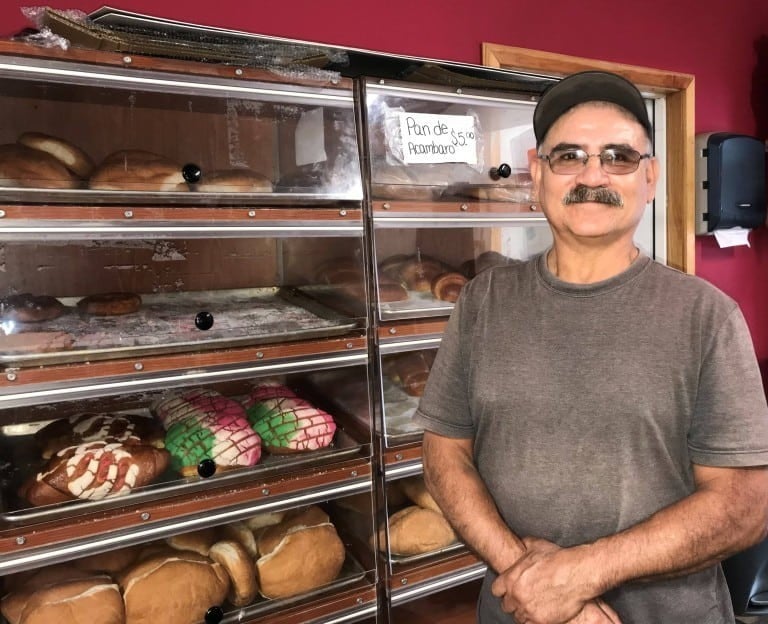- Cliente destacado
- Artículo
- Lectura de 6 minutos
- Last Updated: 09/16/2021
Former Migrant Worker Brings Taste of Mexico to His Business

Table of Contents
As the nation celebrates Hispanic Heritage Month — Sept. 15 to Oct. 15 — it’s important to know there are many Hispanic business owners such as Francisco Morales, and just like him, the fabric of their story is woven with success.
Francisco Morales knows a little something about mummies, hailing from Guanajuato, Mexico — renowned for its mummy museum. What’s interesting about mummies is you can learn so much more by studying what’s around them. Same could be said for Morales, who owns and operates Ranchis Fiesta in Marion, N.Y.
Describing Ranchis Fiesta as a traditional Mexican market wouldn’t do it justice. It looks like an old warehouse, which it was long before Morales bought the land it sits on in 2010. Before entering, one walks through a parking lot where hens and roosters roam about then you are met by colorful plants — sunflowers to cacti — lining the doorway.
Just inside, there are shelves of bread and pastries, followed by pallets of comfort food, from chips to soda to packages of Gansitos — a chocolate-covered cake filled with cream and jelly (think Twinkie).
And, of course, the one constant in the shop: Morales himself. The other constant is Paychex.
“For years as a migrant worker, I just saw things that informed me,” Morales said. “This is a family business. I pay in cash, but I wanted to do things right.”
He visited his bank and they recommended he work with Paychex for his payroll needs.
“I didn’t want any trouble with the government or with taxes, so I needed experts in those areas,” he said. “I find it easy [working with Paychex]. I have no worries, so I can just run my business.”
He then immediately offers an interesting tidbit, a portion of material to begin unwrapping his story.
“I never wanted to own a business,” Morales said. “I enjoy being on the land, working on farms.”
He’s a man of medium height and build in his early 60s, but just looking at his arms and his hands it’s easy to see that Morales has worked the land. Since his arrival in the United States in 1978 at age 19 as a migrant worker, he’s seen a lot of this land — picking tomatoes, squash, limes, oranges, hops, peaches, cherries and apples — from Georgia to California, Pennsylvania to Oregon.
It was a trip to Williamson, N.Y., in 1994 to harvest apples that changed and influenced his journey.
“I liked the weather during picking season here … I just didn’t realize it wasn’t always that nice,” Morales said, letting out a laugh at that memory that led him to move his family to New York in 1995.
Factory work followed, as did the opportunity to work on farm machinery and learn about mechanics.
But a trip to Reading, Pennsylvania, to visit relatives introduced him to an authentic Mexican bakery that eventually would lead to the opening of Ranchis Fiesta. He loved the traditional Mexican bread that was sold there. He bought 80 loaves and headed back to New York, only to find that he couldn’t use it all.
“I was afraid it would go to waste, so I began sharing it with friends, who then wanted more of it,” Morales said. “They actually encouraged me to make a business of it.”
Morales decided he wanted to help the migrant worker community he had been so intertwined with for decades. And, so, trips to Reading became a staple and selling loaves out of the back of his truck became something the migrant workers looked for to provide them with a staple — bread and a reminder of home in Mexico.
It was this community that drove Morales’ early bread business. “They said, ‘You get us the bread and we’ll get you the clients’,” he said.
With their hands on another thread of material to pull back on the self-proclaimed introvert, his customers began prodding Morales for more goods, and fate intervened. His hours were cut at the factory and he became restless.
“I was used to working 12-hour days, 7 days a week. I enjoyed being busy,” Morales said. “Without the momentum of something to do, I created something to do.”
With help from his wife, Maria, several of his four daughters and a nephew, he pooled together enough money to buy the land in Marion that had a dilapidated building on it and several other structures.
“I didn’t even know what I was going to do with the warehouse when I bought the land and was asked by the town what I was using the building for,” Morales said. “A lot of my life is like that. I get a push from an outside factor to do something — buy bread, open a shop — but I think that’s important.
“In order to succeed, you can’t be fearful; you have to be bold and take the steps necessary.”
Morales took one big step when he decided to end his bread runs to Pennsylvania and make things onsite. He bought a mixer — a friend of his had baking equipment in storage that his family sold to Morales — got some help from his daughter who decorates cakes at Walmart and started stocking his shelves at Ranchis Fiesta.
He gets help around the shop from daughters Claudia and Anna and some of that “push” he talks about from his daughter, Maria. In fact, his daughter, Maria, asked him to expand to meet the demand but Morales said, “One store is enough. There is one of me and one store.”
Maria and her husband decided to open an authentic Mexican shop in Geneva, N.Y., and then gave Morales one more push for his business.
“They wanted to buy a food truck but after they bought it, they got too busy at their store, so I already was paying for half and now I am paying for all of it,” Morales said.
The yellow truck sits on the side of the shop and has begun serving tacos and traditional Mexican fare Fridays through Sundays, and the response has been overwhelming.
“My customer base is growing, especially from people who work around Marion,” Morales said. “They love coming for the food.”
Likewise, the migrant workers keep coming for the bread, pastries and other goods in the shop. And the Mexican community that lives in the region year-round comes by the busloads to do their weekly shopping, mostly after harvesting season ends, according to Morales.
In trying to peel back more threads to fill in the details about Morales, he is quick to correct one thing: he hasn’t done it alone. “Too many people have been involved in guiding me,” he said.
“It’s funny, my father had an ice cart and wanted me to do that for a living in Mexico,” Morales said. “But I loved the land and working it. My father eventually ended up making and selling tacos. And look at me now, I make and sell tacos. My whole family in Mexico says his ghost is pushing me to do things.”
And what’s next for the business? What will be the next push Morales will receive? He begins talking about how customers have been asking about fresh meats. He does have a cooler that is almost ready to go.
“Maybe a butcher shop?” Morales said, smiling.
One thing is unquestionable; Look around at what Morales has accomplished and you’ll learn a lot about the man. He provides a bit of home to migrant workers far from home, his family and friends with a business to be proud of and the greater community as a whole with pieces of himself influenced by his own experience. He started working for others and now, in his own words, is “his own boss.”
As the nation celebrates Hispanic Heritage Month — Sept. 15 to Oct. 15 — it’s important to know there are many Hispanic business owners such as Francisco Morales, and just like him, the fabric of their story is woven with success.
Tags







